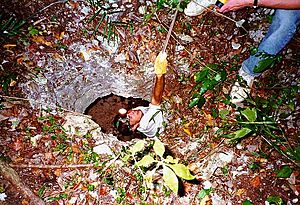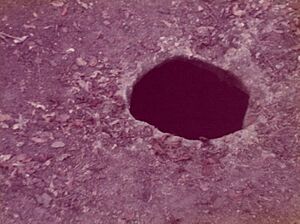Chultun facts for kids
A chultun (say "chul-toon") was a special underground room built by the ancient Maya people. It looked a bit like a bottle. The Maya lived in southern Mesoamerica, which is a region in Central America. These underground rooms were usually made to collect and store drinking water.
The entrance to a chultun was often surrounded by a plastered area. This area helped guide rainwater into the chultun during the rainy season. This way, the Maya could save water for when it was dry. Most chultuns worked like cisterns, which are tanks for storing water.
Why Were Chultuns Built?
Chultuns were often built in places where there were no natural water sources like cenotes. Cenotes are natural sinkholes filled with water. For example, in the Puuc hills, which are high above the underground water supply of the Yucatán Peninsula, chultuns were very important.
While many chultuns were built to collect water, not all of them were used for that purpose. Some chultuns may have been used to store food that could spoil easily.
Storing Food
In the 1960s, a researcher named Dennis E. Puleston studied chultuns near Tikal. He found that chultuns were very good for storing ramon nuts (also called Brosimum alicastrum) for a long time. This showed how important chultuns could be for keeping food safe.
What Happened to Old Chultuns?
After a chultun was no longer needed for water or food storage, it was sometimes used for other things. People might throw away old items in them. Sometimes, they were even used for burials.
Because of this, chultuns are a great source of information for archaeologists. They help us learn about the daily life and customs of the ancient Maya people.
See also
 In Spanish: Chultún para niños
In Spanish: Chultún para niños
 | Sharif Bey |
 | Hale Woodruff |
 | Richmond Barthé |
 | Purvis Young |



